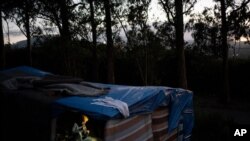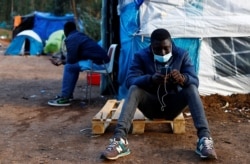Like thousands before him, Oufame Mdiay left Senegal in search of work and a better future.
Taking his life in his hands, he spent a week in a cramped boat with nearly 130 others who recently made the Atlantic journey from Senegal to Spain’s Canary Islands, 100 kilometers off the coast of Morocco.
“I want to find work here as there is nothing for me back in Senegal. I came with my four brothers,” he told VOA from his temporary new home on the island of Gran Canaria.
The 19-year-old is learning Spanish while he waits to find out if his claim for asylum will be successful – or he will be deported back to Senegal.
Spanish Prime Minister Pedro Sánchez will make the reverse journey, traveling from Madrid to Senegal and Angola starting Wednesday - in an official jet rather than a flimsy boat - to launch a new diplomatic initiative to make Africa a priority for Spain.
Spain's leftist government wants to combat illegal immigration by boosting Madrid's economic links with a raft of African nations by 2023.
During his visit to Senegal, Sánchez will praise the work of Spanish police who are posted in the West African to fight people smugglers.
The goal of the strategy is to curb illegal immigration that brings thousands of unskilled African laborers who, some politicians complain, contribute little to the Spanish economy.
The strategy, called Africa Focus 2023, also includes a plan by the government to encourage financial programs to support Spanish companies seeking to expand in Africa and to call for debt relief for African nations at G20 meetings.
The program also includes a raft of educational initiatives including one called Eramus+ that will attempt to encourage Africans to come to Spain to train for jobs which could be useful for the Spanish economy in the future.
This would reverse the trend of sub-Saharan migrants who end up picking crops or peddling fake designer handbags on Spanish beaches.
In the past year, Spain has become the focus of the European migration crisis after more than 25,000 people arrived in the Canary Islands since January 2020 from Western Africa.
Authorities were left struggling to cope with the deluge of arrivals and thousands were left living in tents in a makeshift dockside camp.
Emergency camps were set up but the trail of migrants trying to escape the economic crisis in Africa caused by the pandemic shows no signs of let up.
Escalating efforts
Apart from economic aid to African states, a Spanish warship will be deployed off the coast of West Africa to combat the pirates and smugglers.
At a time when Spain’s unemployment rate and the number of failing businesses are surging as a result of the pandemic, the measures are a sign of a growing urgency for Madrid to halt illegal immigration.
“We think that the most effective way to obtain this result is through prevention at origin and transit countries,” a Spanish Foreign Ministry source told VOA.
“Prevention means assisting our migratory partners in coping with the challenges on drivers of involuntary migration from their countries so the link between migration and development will be for some time still strong,” the source said.
Spain will also boost support, both politically and financially, to law enforcement agencies in training in African states that are on the front line against the fight against people smugglers.
Analysts believe Spain's diplomatic initiative needs to reverse years of neglect of the region by Europe while China has forged strong links with many African states.
“Europe has got to get a more efficient relationship with Africa in terms of instilling more democracy, better practices for immigration and economic investment. They have got to reverse this division which has existed until now,” Carmen González, an expert in international migration at the Real Elcano Institute, a Madrid research organization, said.
She said opening up an Erasmus scheme for African students would start to give them a chance to train for qualified jobs.
González said Spain, like other southern European countries such as Greece and Italy that have received large numbers of migrants in recent years, have failed to obtain the support they need from the EU to cope with the burden.
“The EU has to take into account more the African perspective or the problem will carry on. There must be more solidarity among EU states.”
NGOs welcomed the Spanish government’s initiative but called for more humanitarian visas for migrants to gain access to Europe instead of closing frontiers in return for economic aid.
“One of the ways for legal and secure access to Spain that they could start is the concession of more humanitarian visas for people who feel that they have been forced to leave their countries because they have no other option, especially from African countries,” Nuria Ferre, of the Spanish Commission for Refugees, told VOA.
“We think this would be the best way to reduce illegal immigration and not asking transit countries to close their frontiers in return for more aid for development,” Ferre said.








